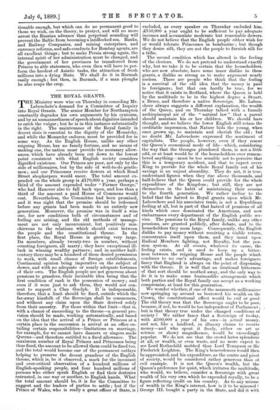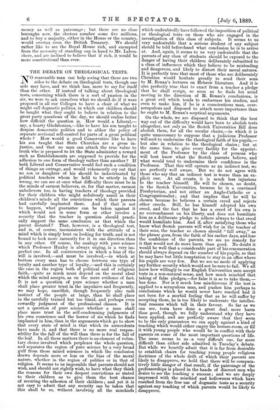THE ROYAL GRANTS. T HE Ministry were wise on Thursday in
conceding Mr. Labouchere's demand for a Committee of Inquiry into Royal Grants. The senior Member for Northampton constantly degrades his own arguments by his cynicism, and by an unmannerliness of speech about dignities intended to catch the vulgar; but he is in this instance substantially in the right. The maintenance of the Royal family in decent state is essential to the dignity of the Monarchy, and while the Monarchy endures, must be provided for in some way. As the English House, unlike any other reigning House, has no family fortune, and no means of making one, the nation must provide the necessary allow- ances, which have already been cut down to the lowest point consistent with what English society considers dignified existence. Our Princes are poor, not only by the side of millionaires, but by the side of well-to-do gentle- men ; and our Princesses receive dowers at which Bond Street shopkeepers would sneer. The total amount ex- pended on the whole group is £170,000 a year, perhaps a third of the amount expended under " Farmer George," who had Hanover also to fall back upon, and less than a third of the amount a paid House of Commons would cost. Nevertheless, the Committee had been promised, and it was right that the promise should be redeemed before any grants had been made to an entirely new generation. Moreover, the promise was in itself a wise one, for new conditions both of circumstances and of feeling are arising, and the old methods of manage- ment are not only inconvenient, but positively mis- chievous to the relations which should exist between the people and the constitutional throne. In the first place, the Royal House is growing very large. Its members, already twenty-two in number, without counting foreigners, all marry ; they have exceptional ill- luck in winning wealthy partners ; and in another half- century there may be a hundred of them denied permission to work, with small chance of foreign establishments, Continental opinion being imperative on the subject of dower, and with no adequate or nearly adequate fortunes of their own. The English people are not generous about pensions to grandees, their incurable idea being that the first condition of rank is the possession of money ; and even if it were just to ask them, they would not con- sent to support a Clan Guelph. It is indispensable, therefore, that a limit should be fixed, outside which the far-away kinsfolk of the Sovereign shall be commoners, and without any claim upon the State derived solely from their ancestry. For those within that limit—that is, with a chance of succeeding to the throne—a general pro- vision should be made, working automatically, and based on the idea that the arrival of a Prince or Princess at a certain place in the succession is arrival at an office en- tailing certain responsibilities—limitations on marriage, for example, for we cannot have dancers or singers made Queens—and therefore entitled to a fixed allowance. The maximum number of Royal Princes and Princesses being thus fixed, the amount to be allowed them could be fixed too, and the total would become one of the permanent outlays helping to preserve the decent grandeur of the English throne, which is, be it observed, a mark for the incessant and over-critical observation of a hundred millions of English-speaking people, and four hundred millions of persons who either speak English or find their destinies entrusted, in one way or another, to English hands. What the total amount should be, it is for the Committee to suggest and the leaders of parties to settle ; but if the Prince of Wales, who is really a great officer of State, is excluded, as every speaker on Thursday excluded him. £150,000 a year ought to be sufficient to pay adequate incomes and accumulate moderate but reasonable dowers. We do not believe that the English people either wish for or would tolerate Princesses in bombazine ; but though they desire silk, they are not the people to furnish silk for a tribe.
The second condition which has altered is the feeling of the electors. We do not pretend to understand exactly why, but we take it to be certain that the householders, who are now absolute, have some inner dislike to these grants, a dislike so strong as. to make argument nearly useless. There are people who think that the feeling is a survival of the old idea that the money is paid to foreigners ; but that can hardly be true, for we notice that it exists in Scotland, where the Queen is held by the multitude to be in the highest degree a Stuart, a Bruce, and therefore a native Sovereign. Mr. Labou- chere always suggests a different explanation, the wealth of the Queen, and on Thursday talked with a funnily archiepiscopal air of the "natural law" that a parent should maintain his or her children. We should have thought, and we believe the lower English still retain the creditable impression, that Nature bids the young, when once grown up, to maintain and cherish the old ; but no doubt Mr. Labouchere expressed the sentiment of capitalists. The people, however, even if they resent the Queen's economical mode of life—which, considering the way that the Georges plundered them, is not a little odd, or at least would be if the householders ever remem- bered anything—must be too sensible not to perceive that this is a temporary accident, and that to expect every King to provide for the whole Royal family out of his savings is an unjust absurdity. They do not, it is true, understand figures when they rise above thousands, and half-believe that the Queen could provide for the whole expenditure of the Kingdom ; but still, they are not themselves in the habit of maintaining their cousins to the fourth generation. We rather incline to the belief that the hatred to Royal grants upon which Mr. Labouchere and his associates trade, is not a Republican feeling at all, but is part of that hatred of pensions of all kinds which once dominated the Americans, and now embarrasses every department of the English public ser- vice. The pensions to the Royal family, unlike any other pensions, are granted publicly, after debate, and to the householders they seem large. Consequently, the English dislike to pay money without receiving a visible return, concentrates itself upon them, and they insist upon Radical Members fighting, not Royalty, but the pen- sion system. At all events, whatever its cause, the feeling exists, and is used to keep up a bitter- ness between the reigning House and the people which conduces to no one's advantage, and makes foreigners fancy that England is always on the point of dispensing with the throne. It is well that an irrational bitternesi. of that sort should be soothed away, and the only way to do it is to make some businesslike arrangement which both parties and the Royal family can accept as a working compromise, at least for this generation. We wonder whether, if one of the mammoth millionaires now springing up around us bestowed his wealth on the Crown, the constitutional effect would be evil or good. The old theory was that the Sovereign ought to be poor, because, if not, he would be too independent of Parliament ; but is that theory true under the changed conditions of society ? We rather fancy that a Sovereign of to-day, with £500,000 a year of his own—in actual money, and not, like a landlord, in illusory claims to receive money—and who spent it freely, either on art or science or showy magnificence, would be exceedingly popular. We do not see that the crowd hates splendour at all, or wealth, or even waste, and no more expect to see Lord Rothschild mobbed than Lord Tennyson or Sir Frederick Leighton. The King's benevolences would then be appreciated, and his expenditure, as the centre and pivot of society, would be considered rather generous than of evil example. It is not the Queen's wealth, but the Queen's preference for quiet, which irritates the multitude, who would, we believe, consider a Sovereign with great wealth of his very own which he expended royally, to be a figure reflecting credit on his country. As to any misuse of wealth in the King's interest, how is it to be misused ? George HI. bought a party in the State, and did it with money as well as patronage ; but there are no close boroughs now, the electors number some five millions, and to buy a majority, either in the House or the country, would overtax even the British Treasury. We should rather like to see the Royal House rich, and exempted from the necessity of standing cap in hand to Mr. Labou- chere, and are inclined to believe that if rich, it would be more constitutional than ever.











































 Previous page
Previous page